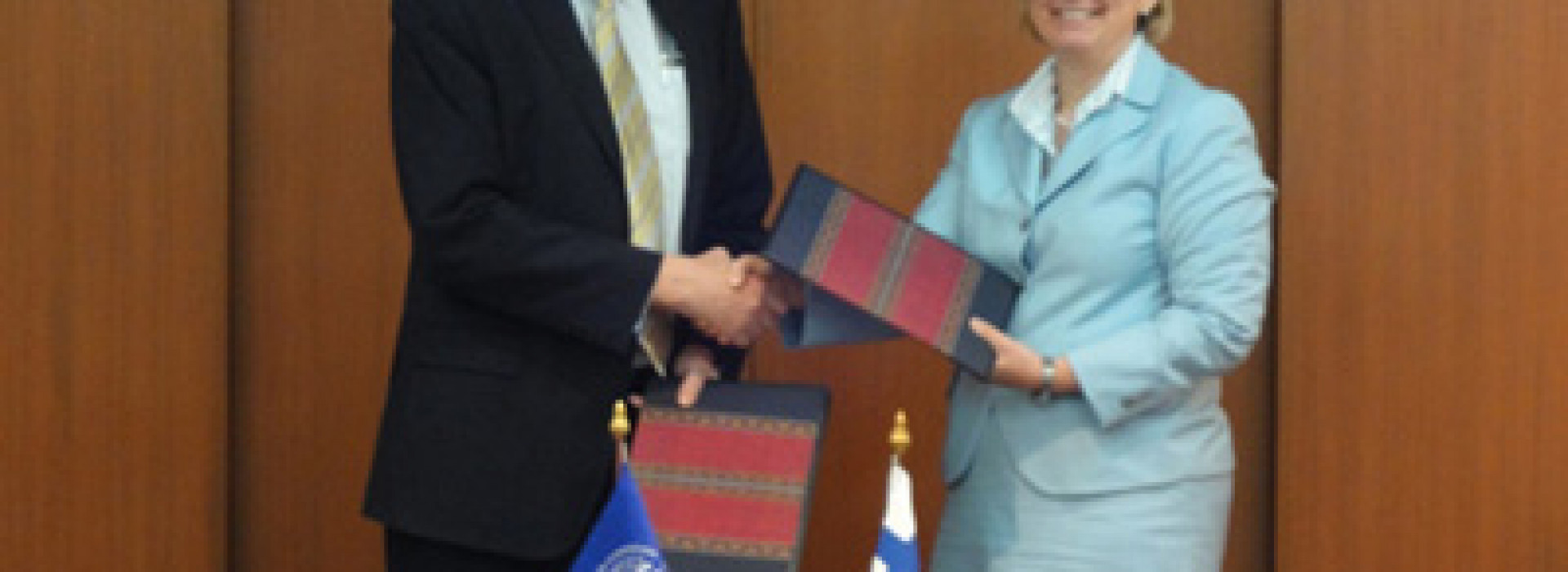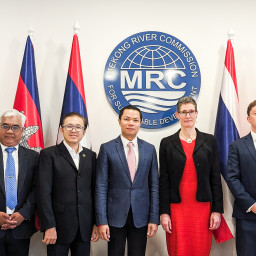Finland renews its support for sustainable hydropower development, knowledge management and capacity
The Government of Finland today committed an 11-million-Euro grant for the lower Mekong region, aiming to broaden its support towards sustainable hydropower development and widened stakeholder engagement in addition to other existing activities.
The fund, which is provided through the Mekong River Commission (MRC), will assist the organization in working with its four Member Countries, Cambodia, Lao PDR, Thailand and Viet Nam, in further incorporating sustainability considerations into the countries' hydropower development planning.
“The contribution from Finland will help enhance the MRC’s effort to address hydropower and water resources development in the region. It demonstrates our common goal to maintaining a balance between meeting new development needs and protecting the existing benefits of region's extensive natural resources endowment,” said Jeremy Bird, Chief Executive Officer of the MRC Secretariat.
"We are seeing an increasing awareness that development decisions, need to reflect an integrated approach taking into account all social, environmental and economic aspects as well as cross-cutting challenges such as climate change, food security and resource security", noted Mr. Bird.
To respond to these demands, a significant proportion of Finland's support will go to better understanding the full implications of development in a complex river system such as the Mekong, to exploring options and identifying appropriate design approaches.
Finland also encourages decision-makers to carefully consider all aspects of development and to consult all stakeholders broadly, openly and transparently in which part of the fund will be used for these purposes.
“We encourage the MRC to continue to work openly with its Member Countries and different stakeholders, to enhance country ownership and a financially secure international river basin organization,” said Ms. Sirpa Mäenpää, Ambassador of Finland to Thailand.
Stakeholder involvement in decision-making processes will help protect the water resources and future for millions of people who depend on the river, noted the Ambassador.
Since its establishment in 1995, Finland has been supporting the MRC’s role in transboundary water resources governance and in regional cooperation. With the new financial commitment, Finland believes it will be used to strengthen economic opportunities where millions of people depend on water and related resources as their main income and food sources.
“The reduction of poverty is the main objective of development cooperation of Finland. We support MRC because water plays a significant role in reducing poverty, and is linked with several other sectors and areas in cross-cutting ways,” said Ambassador Mäenpää.
Finland has provided continued support to capacity development of riparian officials in the field of water resources management, discussions over the future Mekong River’s water development plans, development of hydrological information and models, reviews and development of MRC organizational strategic plans including the formulation process for the new strategic plan cycle 2011-2015.
Until now, the MRC’s regional programme work has been primarily funded by international partners. However, by 2030, the MRC aims to achieve financial sustainability with contribution from its Member Countries. Part of Finland’s support will go towards assisting the MRC with strategies to progressively achieve financial autonomy.
Note to the editor:
Photos are available upon request.
Finland has been extending its continuous support to Mekong River Commission since 1996 after its establishment under the 1995 Mekong Agreement, but this will be the largest contribution they have ever made to enhance the MRC’s ability to address a wide-range of pressing challenges on Mekong countries’ needs and people’s welfare. They are also the largest donor for the MRC’s Information Knowledge Management Programme in particular, on hydrology modelling. Over the last few years, Finland has supported sustainable hydropower development, basin planning, climate change and adaptation initiative, capacity development in Member Countries in integrated environment and water resources management as well as the MRC Trust Fund, which provides flexible support to MRC programme development.
The MRC Secretariat is the operational arm of the MRC, which is responsible for cooperation on the sustainable management of the Mekong Basin. In dealing with this challenge, it looks across all sectors including sustaining fisheries, identifying opportunities for agriculture, maintaining the freedom of navigation, flood management and preserving important ecosystems. Superimposed on these sectors are the future effects of more extreme floods, prolonged drought and sea level rise associated with climate change. In providing its advice and technical support, the MRC aims to facilitate a broad range of dialogue among governments, the private sector and civil society on these challenges.





